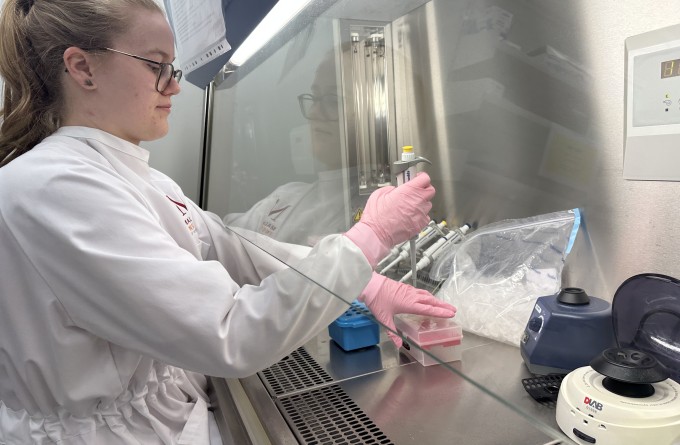20 April 2022
The vast potential of the technology behind COVID-19 vaccines needs to be embraced, not just globally but here in New Zealand, write Kylie Price and Sarah Diermeier.

The role of mRNA vaccines in combatting the ongoing Covid-19 pandemic is indisputable. As it stands, billions of mRNA vaccine doses have been administered in the past year to fight Covid-19. This is a major medical feat unparalleled in history.
What is perhaps less understood is the vast remaining potential of the underlying technology behind those vaccines; nanomedicine technology with the potential to produce countless new treatments for all kinds of disease.
Long before the Covid pandemic spread across the globe, mRNA existed but hadn’t been widely applied due to its inherent instability. As the global scientific community rallied to develop safe vaccines for Covid, a way to deliver mRNA to cells was developed – through lipid nanoparticles (LNPs).

Kylie Price and Sarah Diermeier
LNPs have been proven to provide a safe and stable way to deliver the encapsulation of mRNA for SARS-CoV-2 vaccines. The implications of that success are huge and open an entirely new frontier for the development of novel medicines – nanomedicines.
New Zealand cannot afford to sit on its hands and let the rest of the world embrace what could prove to be the biggest biotech disrupter this century. This disruptive biotechnology can bridge the gap between the laboratory discoveries at which we already excel and supercharge our ability to manufacture and trial new medicines domestically.
The advent of LNP encapsulation technology, and the tide of new nanomedicines it will enable, could be the catalyst that New Zealand’s nascent biotech sector needs.
The relatively reduced costs of the infrastructure required to produce RNA therapeutics such as mRNA vaccines in-country means it is time for us to act. The potential to grow companies, create jobs, and help patients by just engaging with this technology are vast.
‘New Zealand cannot afford to sit on its hands and let the rest of the world embrace what could prove to be the biggest biotech disrupter this century.’
If New Zealand were to establish nanomedicine manufacturing capability, there would be tangible health benefits for Kiwi patients. Nanomedicine clinical trials in this country would lead to earlier access to the latest therapies that may otherwise take decades to make it here.
The capital and expertise developed through early clinical development of new medicines will grow and develop the biotech sector, creating science jobs and contributing to the economic diversification that many New Zealand governments have aspired to, but few have managed to meaningfully progress.
Domestic companies, looking to develop new therapies from research discoveries made in New Zealand labs, will be able to obtain clinical results from New Zealand trials without relying on overseas manufacturers, whose capacity is often absorbed by major industry clients.
This lack of capacity is restricting current delivery timelines for some of our biotech startups and creating in-country manufacturing options would mean these companies will have a more reliable and faster supply chain.
New Zealand’s track record in biotech manufacturing and biotech research
New Zealand as a country doesn’t have the best track record of developing medicines and bringing them through to the clinic. Therefore, shouldn’t we just leave the discoveries to the rest of the world and wait for them to come through onto the New Zealand market? Many would argue that this approach has historically not served us well.
Despite this, New Zealand is still regularly cited as one of the leading locations in the world to undertake biotech research. A study ranks us fourth in the world in categories such as IP protection and enterprise support. We also have the most PhD graduates in life sciences per capita and the best political stability, both of which are important elements for the long-term investment required for successful biotechnology.
The hub argument
Scientists around the world will be working to apply the potential of LNP nanomedicines to a vast array of different health needs. Billions of dollars will be invested into their development. The variety of applications is plentiful enough that we don’t need to fear competition from established, better-resourced organisations overseas.
Applications such as gene editing, rapid vaccine development, immuno-oncology, and solutions for previously undruggable targets will just be the start. And this is to say nothing of the potential applications in animal health, agriculture, and primary industries.
The implications have already been spelt out for us through the ongoing pandemic, and our reliance on internationally manufactured vaccines as a cornerstone of our Covid response.
If New Zealand develops proven expertise and capacity for developing nanomedicines, the next time a novel infectious disease emerges on the world stage we could be in a position to control the manufacture of our own vaccines at least. Or, at best, to provide the rest of the world with the solution.
Kylie Price is chief technology officer at the Malaghan Institute of Medical Research and Dr Sarah Diermeier is chief scientific officer and founder of Amaroq Therapeutics.
This article was originally published as a guest opinion on NBR

Malaghan scientists appointed in leadership roles in New Zealand's RNA Platform
31 May 2024

Kia Niwha Leader Fellowship for Malaghan vaccine researcher
6 May 2024

In Focus: Tailoring mRNA vaccines for immunocompromised populations
14 December 2023

Scientific breakthrough harnesses mRNA technology to develop powerful malaria vaccine
21 July 2023

International collaboration to crack the code on the ageing immune system
31 May 2023

New funding will boost RNA research into vaccines and other healthcare treatments
22 March 2023
